- There are no more items in your cart
- Shipping Calculated at checkout
-
Sub-Total (inc. VAT)
£0.00
Need Help?
uPVC Paint
Painting uPVC has revolutionised home design, offering an affordable way to refresh exteriors and interiors. In 2025, why not update tired surfaces with specialist uPVC paints? Available in over 5,000 colours—including the ever-popular Anthracite Grey, Chartwell Green, and Sage Green—these paints provide a sleek, durable finish without costly replacements.
Perfect for windows, doors, conservatories, and PVC cladding, Rawlins’ high-performance uPVC paints are UV-resistant, long-lasting, and easy to apply with a brush, roller, or spray. Whether you’re a DIYer or a professional, trusted brands like Zinsser, Rust-Oleum, Kolorbond, HMG, and Bradite ensure a flawless, factory-like result.

Zinsser AllCoat Exterior Shades of Grey - Satin (Water Based)
Pick from 290+ greys shades of grey including Anthracite Grey in Zinsser's ultimate all surface paint with up to 15 years performance on uPVC, doors and windows, composite surfaces, exterior woodwork, masonry, cladding, Plastisol, steel, and more. Simply click 'Choose a colour' to see these shades. Recommended for use on uPVC - read our...
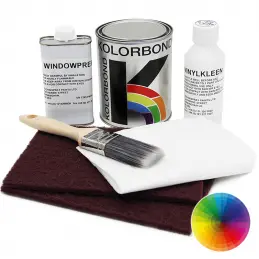
Kolorbond uPVC Painting Kits
5,000+ Colours. Kit based around Kolorbond Aquatek. For uPVC windows, doors and fascias, as well as composite doors. Low odour, water-based. Please note: Colours are sold in the nearest tin size but actual paint volume per tin may vary up to 10% depending on colour. Chemically bonds with the surface - 10 year guarantee....
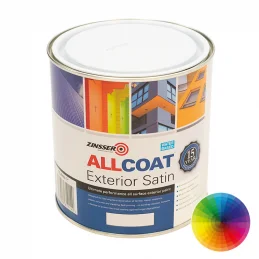
Zinsser AllCoat Exterior Satin (Water Based)
High-performance paint suitable for all exterior surfaces in 4,400+ colours. Including RAL 7016 Anthracite Grey and Chartwell Green. Perfect for use on uPVC, timber, metal, masonry and exterior brickwork, plastic (incl. composite), concrete. Also cladding, weathered bitumen, stucco, brick, stone and more. Re-coatable in just 1 hour,...

Rust-Oleum uPVC Door and Window Paint
110 colours. For uPVC, composite doors, window frames, conservatories, fascias, drain pipes, and guttering. Self-priming, dries in just 1 hour. Weather-resistant and mould/algae resistant. Exceptional coverage and colour-fast properties. Virtually odourless, water-based.

Zinsser AllCoat Exterior Chartwell Green - Satin (Water Based)
Ultimate all surface paint with up to 15 years performance, available in Chartwell Green and recommended for use on uPVC and composite windows and doors. Also suitable for masonry, timber, metal, plastic, concrete, cladding, weathered bitumen, stucco, brick, stone and more Read our blog post on painting uPVC, or click here for commonly...
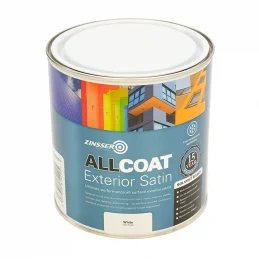
Zinsser AllCoat Exterior Satin (Solvent Based)
Ultimate performance all-surface paint in 4,400+ colours. For use on surfaces including uPVC, timber, metal, masonry, plastic, concrete, cladding and more. Multi-surface application with excellent colour retention. Weather-resistant and resistant to showers after 1 hour. Re-coatable in 3 hours and designed for long-term decoration....
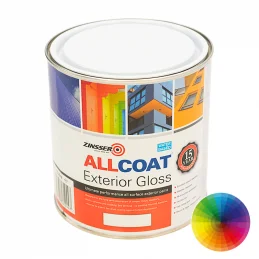
Zinsser AllCoat Exterior Gloss (Water Based)
Ultimate performance all-surface paint in 4,400+ colours. Suitable for uPVC and composite, timber, metal, masonry, plastic, concrete, cladding, and more. Offers excellent resistance to cracking, blistering, and flaking. Features a biocide to protect against fungal degradation. Self-priming and bonds to existing glossy paints without...
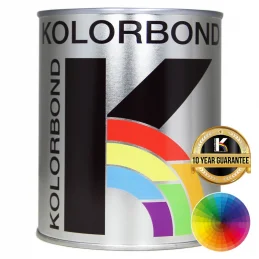
Kolorbond Original
5,000+ Colours. Premium coating for PVCu plastic and powder-coated surfaces. Gloss, satin or matt finish. For windows, doors, cladding, and conservatories. High UV protection, weather resistant. Chemically bonds with the surface - 10 year guarantee. Extremely colour stable - guaranteed to hold its colour, without excessive...
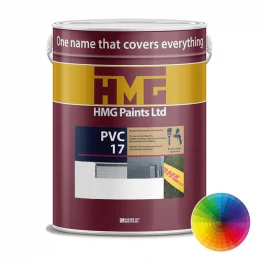
HMG PVC17 Colours
Single pack vinyl acrylic in 5,000 colours for direct application to many difficult to coat substrates including hard plastics, powder coatings, most factory finishes and architectural cladding. Also suitable for flexible substrates, PVC curtain material, uPVC, plastisol, cladding coatings and fibreglass* *for areas incorporating draught...
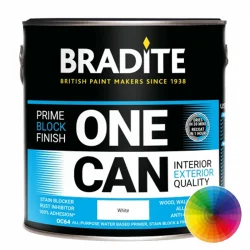
Bradite One Can Eggshell
2,500+ Colours. Quick-drying, low-odour, water-thinned primer and finish coat. Excellent adhesion, stain-blocking, and anti-corrosive properties. For ferrous and non-ferrous metals, plastics, ceramic tiles, glass, wood, and existing painted surfaces. Weather and light resistant. Please note: Colours are sold in the nearest tin size...
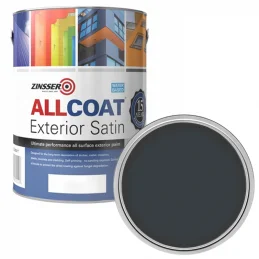
Zinsser AllCoat Exterior Anthracite Grey - Satin (Water Based)
The ultimate all surface paint with up to 15 years performance, available in Anthracite Grey and recommended for use on uPVC and composite windows and doors. Looking for a lighter or darker grey? Pick a trending shade of grey here Also suitable for masonry, timber, metal, plastic, concrete, cladding, weathered bitumen, stucco, brick,...
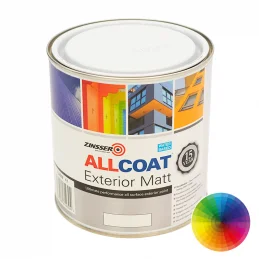
Zinsser AllCoat Exterior Matt (Water Based)
Matt All-Surface Paint in 4,400+ colours. Perfect for all exterior surfaces including uPVC, wood,metal, masonry, and more. Provides long-term decoration with excellent colour retention. Re-coatable in 1 hour, making projects quick and efficient. Low maintenance, water-shedding coating with a vapour-permeable finish. Contains a biocide...
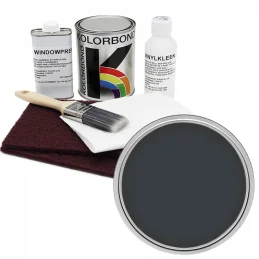
Kolorbond Anthracite Grey uPVC Painting Kits
Contains all of the products and application tools required to ensure a high quality finish on uPVC windows, doors, fascias, and composite doors. Technispray Kolorbond Aquatek is a water-based, low-odour, quick-drying exterior and interior coating for PVCu (uPVC). Available here in Anthracite Grey (RAL 7016) (looking for a lighter or darker...
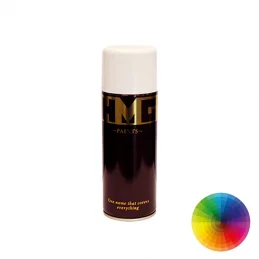
HMG PVC17 Colours Aerosol
Vinyl Acrylic Aerosol with 5,000 colours - exceptional flexibility and adhesion for direct application to many difficult to coat substrates including hard plastics, powder coatings, most factory finishes and architectural cladding. 400ml/16oz Aerosol Available in packs of 1 or packs of 2-10, 40, 50, 100 and 500 with qty price breaks Also...

Zinsser AllCoat Exterior Shades of Green - Satin (Water Based)
Pick from 1100+ green shades of green in Zinsser's ultimate all surface paint with up to 15 years performance on uPVC, doors and windows, composite surfaces, exterior woodwork, masonry, cladding, Plastisol, steel, and more. Click 'Choose a colour' to see these shades. Recommended for use on uPVC - read our blog post on painting uPVC doors...
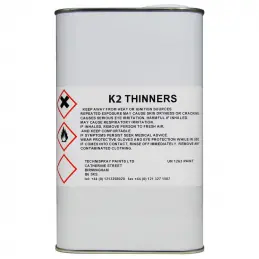
Kolorbond K2 Thinner
Thinner for use with Kolorbond K2 and the brush grade version Kolorbond DecoPro. More Info Delivery Info
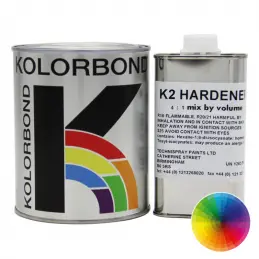
Kolorbond DecoPro
5,000+ Colours. Two-pack polyurethane (PU) coating. For metals, glass-reinforced plastic (GRP), and hard plastics. In multiple gloss levels (10%, 30%, 50%, and 70%). Professional use only. Fire tested to: ISO 5658-2:2006+A1:2011; does not upgrade surface. Full report can be found in the Data Sheets tab below. Please note: Colours are...
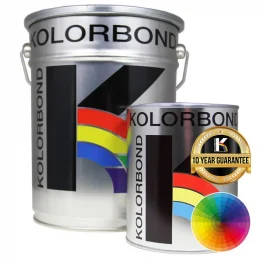
Kolorbond K2
5,000+ Colours. Two-pack polyurethane coating designed for industrial applications. For metals, GRP, and hard plastics. Matt, Satin, Semi-Gloss and Gloss finishes. Professional use only. Fire tested to: ISO 5658-2:2006+A1:2011; does not upgrade surface. Full report can be found in the Data Sheets tab below. Please note: Colours are...
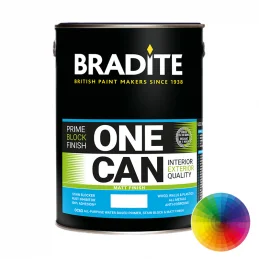
Bradite One Can Matt
2,500 Colours. Quick-drying primer and finish coat. For masonry, metals, plastics, wood, glass, ceramic tiles, and previously painted surfaces. Interior/exterior use. High adhesion, stain blocking, and anti-corrosive properties.
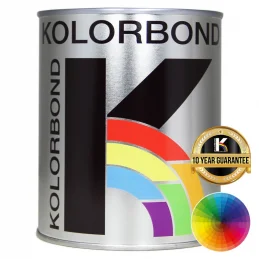
Kolorbond Aquatek
4,900+ Colours. Single-pack water-based satin coating for interior and exterior use. For uPVC, hard plastics, polyester powder coatings, GRP, and primed wood. Resistant to scratches and weather. Fire tested to: ISO 5658-2:2006+A1:2011; does not upgrade surface. Full report can be found in the Data Sheets tab below. Please note:...

Zinsser Satin uPVC Paint (Water Based)
4,400+ colours (including anthracite grey and chartwell green) for all exterior uPVC and composite surfaces. Front and back doors and window frames, conservatories, dormer windows and skylights, downpipes and guttering, fascias and soffits, trims, ledges and sills. Go further by colourmatching garage doors, non-uPVC doors and windows and...

Hanford & Green uPVC Paint
5,000+ Colours. Durable uPVC Acrylic Paint. Internal or external use. For uPVC window frames, doors, cladding, high-use interior trim surfaces, and primed metal surfaces. High scrub and mould resistance. Virtually no odour and low VOC content. Order A Colour Sample (Standard) Order A Colour Sample (Tinted)
Need Help?
Need Help?
Why Use uPVC Paint?
Specialist uPVC paint bonds with non-porous surfaces, offering a durable, protective finish. Unlike standard paints, these coatings resist UV damage, fading, and abrasions, extending the life of fixtures and fittings. So, get that colour or finish you’ve seen trending on TikTok or Instagram, or upgrade your home, property or business today, with uPVC paints at Rawlins.
Can You Paint uPVC?
Yes! With proper preparation and specialist uPVC paint, you can achieve an as new look, without the need to replace any of the fittings. Kolorbond uPVC Painting Kits are a great place to start, as they provide all the products you’ll need to prepare, apply and finish the project with a professional finish.
What uPVC Paint Colours are Available at Rawlins Paints?
Kolorbond products come in 5,000+ colours, including popular greys, greens, and classic whites. Whilst the popular Zinsser AllCoat range is available in 4,400+ colours. The trending Chartwell Green, Sage Green, Anthracite Grey and Light Grey are available from both brands, whereas Rust-Oleum uPVC has a bespoke range of 110 colours – including several pale greys - that can also be used to colour match drainpipes and guttering.
Can uPVC Paint be Used on Doors and Windows?
Absolutely! It’s ideal for modernising uPVC doors and window frames, and a lot cheaper than replacing your existing fittings just to change the colour! Many people like to colour match the window frames with interior window blinds or exterior window shutters, too – it is advised to check product datasheets to see if the blind material is suitable to share a tin of paint, but generally Zinsser AllCoat products are generally suitable for most surface and substrate types.
How Long Does uPVC Paint Last?
With correct application, it lasts for up-to 10 years, resisting weathering, colour-loss, and UV damage. You will not get this lifespan from lesser-quality products, which is why Rawlins Paints only stock durable, high-quality finishes for customers who require specialist products that you can put your trust in.
Why Shop at Rawlins Paints?
Rawlins’ Technical Support Team has extensive experience with specialist paints and coatings, answering customer queries on uPVC painting projects of all sizes. We stock products tailored to your needs—whether it’s colour selection, interior or exterior use, durability, or finish.
Need advice? Contact us via phone, email, or live chat.
The information provided above is a basic overview and is intended as general information only. It is not advice, and is given without warranty. You should always refer to the relevant data sheets and our Technical Team prior to purchase or use of any products.
